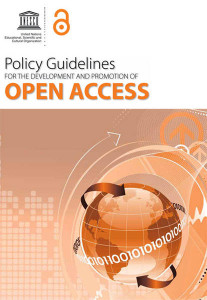Brazil is one of the countries in the world which has made the greatest progress in Open Access journals and repositories that make the full texts of publicly funded research freely available at no cost via the Internet. And SciELO, an undertaking initiated in Brazil and which now has academic journal collections from 15 countries, is an example mentioned by these new UNESCO guidelines on the policies for the development and promotion of Open Access (p.20).
The UNESCO Policy guidelines for the development and promotion of open access has as its objective the promotion of Open Access in all of the UNESCO Member States. These Guidelines facilitate the understanding of the most important aspects of Open Access so that countries and their institutions may evaluate their own situations with respect to scholarly communication in Open Access and select appropriate policies and link them to their national research systems. The Guidelines point to the crisis in the cost of subscriptions to academic journals as the reason behind the formation of the Open Access movement, but we could say that in Latin America the origin of the Open Access movement is more related to the lack of visibility of the scholarly knowledge produced in the region in international indexes, and to taking advantage of the Internet and the Web to develop options to publish in Open Access.
In its first sections, the Guidelines set out the history and scope of the Open Access movement along with its principal international declarations. In an upcoming edition of these Guidelines, a reference to the Salvador Declaration on Open Access: the developing world perspective could be added, a Declaration promoted by SciELO in 2005 which urges governments to make Open Access a high priority in their scholary development policies. These include:
- Insist that publicly funded research is available in Open Access;
- Consider the cost of publication as part of the cost of research;
- Strengthen local Open Access journals and repositories, and other relevant initiatives;
- Promote the integration of scholarly information from developing countries into the repository of the world’s knowledge.
Next, the UNESCO Policy guidelines for the development and promotion of open access presents sections on the importance and benefits of Open Access and the ways to implement it: the so-called “Green Road”, under which authors self-archive their output in institutional and thematic repositories, and the “Gold Road” of publication in Open Access journals. In terms of contents in digital repositories, the Guidelines make a welcome statement about the importance of archiving not only academic articles in them, as established by the first declarations on Open Access, but also Masters’ and doctoral theses, research data and peer-reviewed books (p.10).
In dealing with Open Access business models the Guidelines first describe the alternative of “the author pays”. Perhaps this alternative should not be emphasized in the first place as a business model for Open Access. In fact, only 30% of the world’s Open Access journals charge author fees (article processing charge)(DOAJ). The business models in Open Access is one of the topics that will generate more tension in the coming years and the international scientific community must debate who should pay for Open Access and how it should be funded, as these are decisions that have a bearing on national and international research policy. For the developing regions, where research is primarily publicly funded, there are models such as those of SciELO and Redalyc in Latin America, AJOL and SciELO in Africa, and ASIAJOL in Asia where the cost of publication in Open Access is considered part of the cost of research and of its dissemination in journals published by the corresponding academic communities, in consideration of knowledge as a public good (Hess-Ostrom, 2006) and which creates “knowledge commons” (p. 27 of these Guidelines). This has been allowing the research community to regain the control handed over to the commercial publishers over the past 50 years (p.30) and reconsiders the communication of research as part of the process and cost of research (p.33).
The legal aspects with respect to copyright and licensing which govern Open Access publishing are presented in the Guidelines in straightforward language in order to advise both authors and institutions. The section dealing with strategies to promote Open Access policies is written in the same way, with examples of organizations which are engaged in these types of activities at an international level. From our own part of the world, we can add La Referencia, an initiative sponsored by RedCLARA and IDB (Inter-American Development Bank) with the participation of the governments of 9 countries whose objective is to coordinate a federation of national repository systems in science and technology within the region. We must also stress the role fulfilled by the activities of professionals who promote Open Access by means of a Latin-American list of Open Access and Repositories with the more than 600 members of its Facebook group LLAAR, which carries out the role of disseminator and promoter of best practices in the field of Open Access. Members of these communities have been organizing and participating in regional events with the aim of exhibiting and sharing the results of initiatives which are being developed in countries throughout the region (e.g. The BIREDIAL Conference).
For decision makers in the management of research activity and its dissemination at the institutional, national and international level, sections 8 and 9 of these Guidelines are of particular interest, dealing as they do with the most important aspects to be borne in mind when developing Open Access policies, such as : where scholary output should be archived, the type of content to be archived, the need to specify the maximum embargo length permitted, legal rights and permissions to be considered, compliance with policies, sanctions for non-compliance of policies, and promotional activities to be carried out in support of these policies. This section is complemented by Appendix 1 which provides a selection of the complete texts of Open Access Policies, and Appendix 2 which provides model policies which can be adapted according to the needs of institutions, research-funding agencies and national governments.
It would be very important for Latin America, and for the world in general as far as the Open Access democratization of the results of publicly funded research is concerned, that the Congresses of Argentina, Brazil and Mexico approve draft legislation in Open Access which is currently under debate (ARGENTINA, BRAZIL, MEXICO and recently approved in PERU). These countries are seeking to put into practice the recommendations of these Guidelines as far as “a more democratic, consultative and open approach to adopt Open Access policy, as success of the policy implementation will depend on the ownership of the stakeholders to deposit their work in repositories and / or publish in Open Access journals “ is concerned. (p.9)
“La producción académica de nuestras universidades no puede estar subordinada a los intereses o vaivenes del mercado editorial. Son nuestras sociedades las que pagan el trabajo que realizan los académicos en América Latina, no las empresas o el sector privado. Todos (pertenezcan o no al mundo universitario) deben tener derecho a acceder gratuita y libremente a las producciones que las universidades y los centros de investigación realizan. No se trata de generosidad. Se trata de una obligación, de un compromiso mínimo con la defensa del espacio público. Simplemente, porque el conocimiento, en una sociedad democrática, debe ser un bien común”. Pablo Gentili, Executive Secretary, , CLACSO¹
The Spanish version of The UNESCO Policy guidelines for the development and promotion of open access is now available. The English version of this document was drawn up by Alma Swan on behalf of UNESCO in 2012.
Note
¹Excerpt taken from the website http://biblioteca.clacso.edu.ar/accesoabierto/
References
SWAN, A. Guía UNESCO para políticas de desarrollo y promoción del acceso abierto. Paris: UNESCO, 2013. Available from: http://unesdoc.unesco.org/images/0022/002225/222536S.pdf.
HESS, C., and OSTROM, E., eds. Overview. Understanding Knowledge as a Commons. December, 2006. Available from: http://mitpress.mit.edu/books/understanding-knowledge-commons.
External links
Declaración de Salvador de Bahía sobre acceso abierto: la perspectiva del mundo en desarrollo – http://www.icml9.org/channel.php?lang=es&channel=87&content=437
Lista Latinoamericana de Acceso Abierto y Repositorios – https://groups.google.com/forum/?hl=es#!forum/LLAAR
Grupo LLAAR en Facebook – http://www.facebook.com/groups/184675074889032/
Draft legislation (Argentina) – http://www1.hcdn.gov.ar/proyxml/expediente.asp?fundamentos=si&numexp=1927-D-2011
Proyectos de ley (Brasil) – http://kuramoto.files.wordpress.com/2011/07/pls387_2011.pdf
Draft legislation (Mexico) – http://www.senado.gob.mx/sgsp/gaceta/62/1/2013-03-14-1/assets/documentos/Ini_Herrera_Anzaldo-CyT_LGE.pdf
Draft legislation (Peru) – http://www2.congreso.gob.pe/sicr/comisiones/2012/com2012ciencia.nsf/0/ cb7c863ded37261e05257b3b007c029c/$FILE/1188_Sustitutoria_27MAR2013.pdf
UNESCO Guidelines (Spanish) – http://unesdoc.unesco.org/images/0022/002225/222536S.pdf
UNESCO Guidelines (English) – http://unesdoc.unesco.org/images/0021/002158/215863e.pdf
 About Dominque Babini
About Dominque Babini
Open Access Program – CLACSO-Consejo Latinoamericano de Ciencias Sociales. Universidad de Buenos Aires-IIGG. http://ar.linkedin.com/in/dominiquebabini
Translated from the original in Spanish by Nicholas Cop Consulting.
Como citar este post [ISO 690/2010]:


















Pingback: UNESCO Guidelines provide a detailed review of Open Access | Portal El Bohio